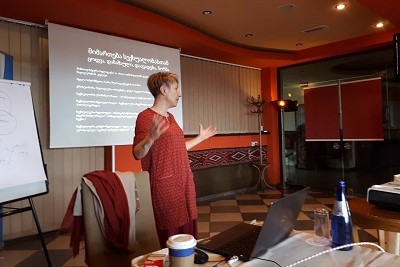Strengthening the protection of LGBTI rights
Date:
To strengthen the human rights protection of LGBTI people, UN Women Georgia and the Women’s Initiatives Supporting Group - a local LGBTI organization - are working towards integrating LGBTI issues in relevant legislative acts and training programmes for a variety of professionals.

International human rights principles and standards – such as the principles of equality and non-discrimination enshrined in the Universal Declaration of Human Rights – and subsequently agreed upon international human rights treaties are at the heart of the Sustainable Development Goals and reflected in the commitment to “leave no one behind”.
Recommendations made by the UN Human Rights Committee call on Georgia to take effective measures to combat discrimination or violence against persons based on their sexual orientation or gender identity. Moreover, in the report on her mission to Georgia released in June 2016, Ms. Dubravka Šimonović, UN Special Rapporteur on violence against women, its causes and consequences, named LGBTI persons as a specific at-risk group suffering from multiple forms of discrimination, which render them more vulnerable to specific forms of violence.
In response, the Women’s Initiatives Supporting Group (WISG) has developed relevant draft legislative amendments aimed at strengthening the protection of LGBTI persons, as well as a training module for various professionals primarily aimed at their sensitization towards LGBTI issues.
On 10 and 11 May and 22 and 23 May 2018, respectively, two rounds of training of trainers were also conducted by WISG for representatives of the Ministry of Internal Affairs, Prosecutor’s Office, Judiciary, Georgian Bar Association, State Fund for Protection and Assistance of Victims of Human Trafficking, and Ministry of Corrections and Probation. The trainings focused on the relevant terms and definitions, the effect of homophobia and transphobia on LGBTI persons and their needs, specificities of working with the LGBTI survivors of violence, among other topics.
Ms. Ekaterine Aghdgomelashvili, director of WISG, remarked: “With the support of UN Women, we have been given a unique opportunity to integrate LGBTI issues in existing protection mechanisms and training modules. Given the fact that the issues regarding sex, gender, sexuality and specifically sexual orientation, gender identity and gender expression are not part of academic education in Georgia, it is of critical importance to equip different professionals with knowledge on the specificities of this group.”
UN Women embarked upon strengthening programming and advocacy on the rights of LGBTI people within the framework of the UN Joint Programme for Gender Equality, implemented by UN Women, UNDP and UNFPA and funded by the Government of Sweden.